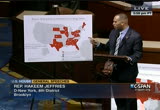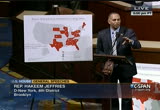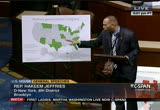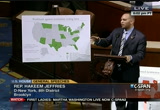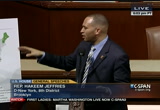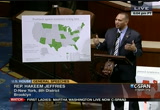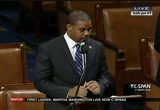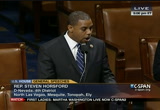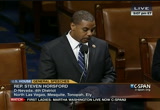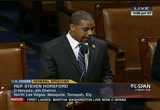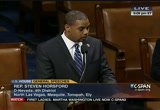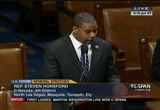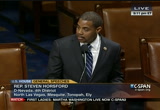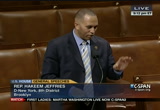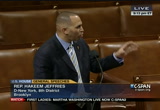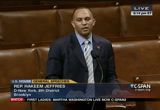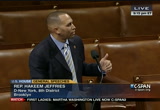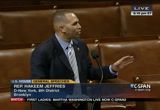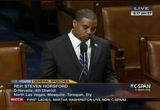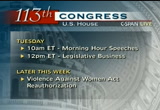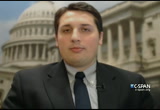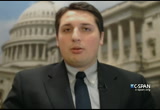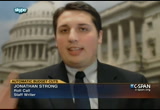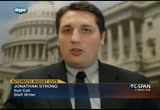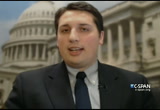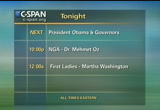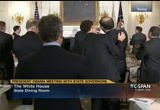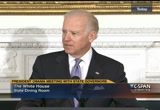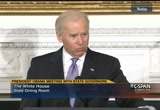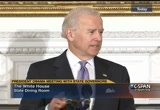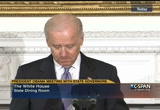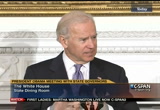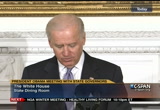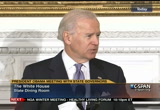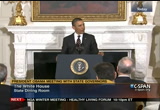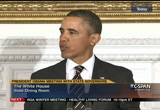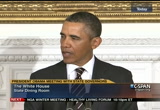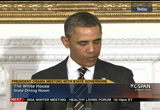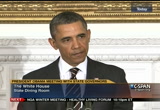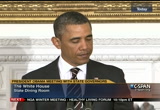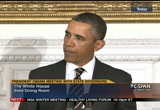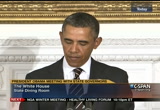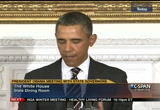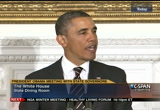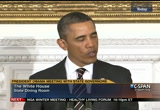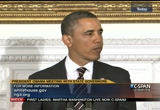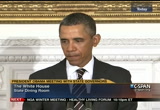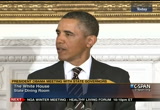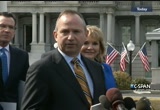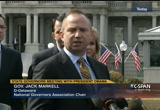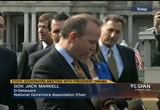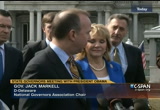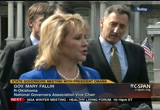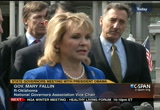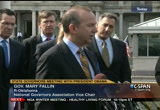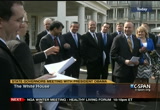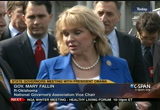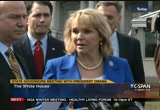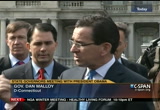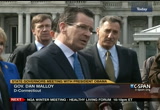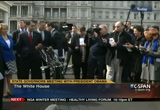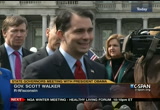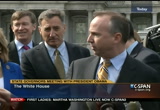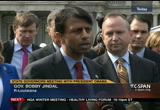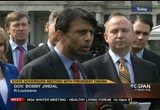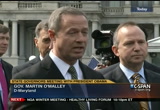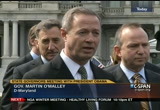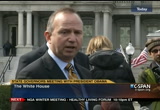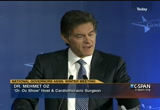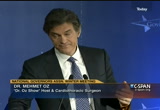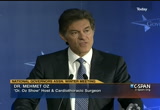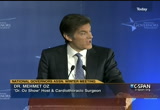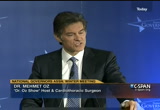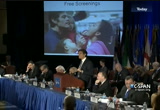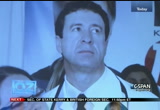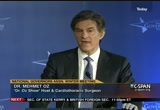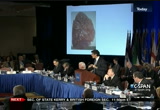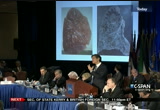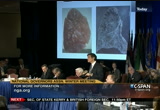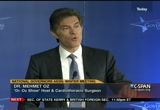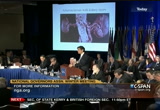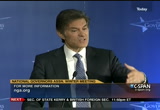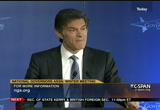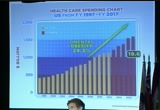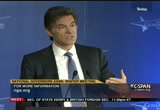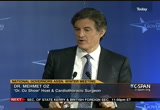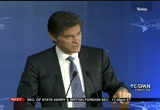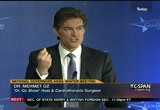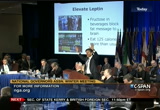tv First Ladies Influence Image CSPAN February 25, 2013 9:00pm-10:30pm EST
9:00 pm
by the section five preclearance requirements. let me just pause parenthetically and note what's interesting, two state, iowa and florida, that in the past had executed through executive order reforms designed to allow those who as a result of the criminal justice system had had their ability to vote taken away from them, restored through a process that had been put in place. but in the aftermath of the election of president obama, what we saw is that in iowa and in florida, those two states, through executived offer, repealed those positive -- through executive order, repealed those positive steps forward to make it almost impossible for those who had brushes with the law to ever be able to re-engage in the ability
9:01 pm
to participate in american democracy. . these were laws that were passed, although because of the section 5 preclearance requirement, not all of these laws actually were able to take effect. that's an important point. as it relates to the continuing relevance of section 5 preclearance requirement. now, as of october in 20 is it -- 23012, approximately 12 courts -- 2012, approximately 12 courts either halted or blunted, they pushed back some of those laws that states had attempted
9:02 pm
to enact. perhaps the most relevant example of why section 5 continues to be relevant, mr. speaker, is what took place in the lone star state, great state of texas, where the legislature had passed what would have been the most restrictive voter identification law in the country. it would have prohibited potential voters from presenting student, college identification. they were deemed in this law as invalid. it would have prevented voters from presenting state government identification. i.d.'s that were actually issued by the state of texas would not
9:03 pm
have been valid under this law. i find it interesting, particularly in light of the current debate that we are having related to how we deal with gun violence in america, is that one of the forms of i.d. actually would have been accepted was a license that allowed an individual to carry a concealed handgun permit. this was too much for the justice department and those who in good conscience seek to defend our democracy to accept. and because texas is a covered jurisdiction, it had to be presented for preclearance by the department of justice or a three-judge panel, and it was
9:04 pm
rejected. so this law though passed never took effect. the same thing happened in alabama. the same thing happened in south carolina. there's a law that was passed by the state of florida that is under consideration and so as a result even though many objectively believe it was designed to suppress the vote, it did not take effect in advance of the 2012 election because it's under view by the department of justice and their preclearance requirement. mr. speaker, in america certainly we have come a long way. but we still have a long, long way to go.
9:05 pm
jim crow may be dead, but he's still got some nieces and nephews that are alive and well. and until every single descendent -- descendent of mr. jim crow are dead and buried, we at the congressional black caucus believe that the section 5 preclearance requirement of the voting rights act remains as relevant today as it was when it was passed in 1965. i yield back the balance of my time. mr. horsford: thank you representative jefferies. mr. speaker, may i ask how much time we have remaining? the speaker pro tempore: the gentleman has 13 minutes remaining. mr. horsford: thank you, mr. speaker. mr. speaker, as we have discussed this evening, as the
9:06 pm
congressional black caucus, voting rights are an issue that all americans are entitled to. and we should be helping more voters participate in our democracy, not creating laws that prevent or discourage anyone from voting. and as my colleague, the co-anchor from new york, mr. jefferies, just explained, we have made tremendous progress in recent history in securing the right to vote for many minority communities. a fully free and democratic society is always a work in progress. and with each election we are reminded that we cannot rest. we must always come to the defense of voting rights. and we cannot be cut off guard or pretend that because time has passed that we do not need the
9:07 pm
continue to fight to safeguard our rights. now, no successful social justice movement has secured freedom absent vigilance. and that's why we are here tonight to defend a pillar of justice and democracy. the voting rights act of 1965 was approved by congress to protect fundamental voting rights and to protect minority groups from disenfranchise -- disenfranchisement. after a series of violent attacks on civil rights leaders who were registering african-americans to vote, former president lyndon b. johnson, sent draft legislation to congress to protect voting rights, and it was signed into law soon thereafter. since then the voting rights act has been one of the nation's most effective civil rights laws
9:08 pm
and tools to combat discrimination in voting. over time the tactic used to stop people from voting have become more sophisticated. unfair voter i.d. laws. barriers to voter registration. and narrowed early voting opportunities were all used in an attempt to suppress the vote in 2012. overall 2,400 changes in voting laws were stopped because of section 5 of the voting rights act, as my colleague, mr. jefferies, just outlined. in january the naacp president said, the nation has been facing some of the, quote, greatest attacks on voting rights since segregation. and that the potential to repeal section 5 is the biggest threat yet. whether it's attempts to
9:09 pm
restrict early voting in ohio or florida, or throwing up billboards in minority communities that read, voter fraud is a felony, we know that our work is not done. intimidation is still a tactic employed by some seeking to scare voters from the polls. and until that threat is extinged -- extinct, section 5 of the voting rights act still has a very important role to play in making full democratic enfranchisement a reality in our society. but we secured the integrity of electorate in 2012, and it's in part because of the voting rights act. now this is not a partisan issue. in fact, there is bipartisan consensus on that point. in 2006, the voting rights act was re-authorized with
9:10 pm
overwhelming support from both sides of the aisle. in fact, this body, the house of representatives, has voted four times with strong bipartisan support every time, to re-authorize section 5 of the voting rights act. every re-authorization has been signed into law by our republican president. the most recent re-authorization vote was 390-33 in the house and 98-0 in the senate. as part of the last re-authorization, congress released over 15,000 pages of committee reports that demonstrated large-scale evidence of voting discrimination. not only did these findings lead to a bipartisan vote to re-authorize the legislation, but congress also cited the invaluable role of section 5 in
9:11 pm
racial injustice. according to the committee report, without the continuation of the voting rights act protection, the evidence is clear that, quote, racial and language minority citizens will be deprived of the opportunity to exercise their vote, but will have their votes diluted. in other words, mr. speaker, the voting rights act is important for many different communities. now, the writing is on the wall. our work is not done. section 5 must be upheld, and because of that we stand in strong support of the voting rights act here tonight. i'd like to now bring my colleague, mr. jefferies, up so that we can highlight some of the provisions of the voting rights act both from a historical perspective, but most importantly how it still applies
9:12 pm
today. mr. jefferies: thank you, mr. horsford. i think that you hit on a very important point that should be re-emphasized in the context of this debate. every single re-authorization of the voting rights act, section 5, was signed into law by a republican president. and so in 1970 the re-authorization was signed into law by president richard nixon. in 1975 it was president gerald ford. in 1982 it was ronald reagan. and in 2006 it was george bush. it was the current house majority held in different form but when republicans were in charge of the chamber who allowed the re-authorization to move forward through the
9:13 pm
judiciary committee on a bipartisan basis. this may seem strange in the current poisonous environment of washington that we exist in right now, but there was significant cooperation, tremendous leadership shown by then chairperson and the ranking memberle it john conyers. it passed in the house of representatives 390-33. it's also interesting to note historically that prior to this year if he ever time section 5 and the voting rights act has been used to address alleged concerns with redistricting, which traditionally take place two years after the completion
9:14 pm
of the census, when it was used by the justice department to block or modify redistricting reforms or changes, prior to the obama administration, every other occasion since the passage of the voth rights act in 1965, it was a republican justice department charged with the responsibility of addressing concerns with redistricting and the problem of racial it gerrymandering. it was the nixon justice department in 1972. it was the reagan justice department in 1982. it was the george h.w. bush
9:15 pm
justice department in 1992. it was the george w. bush justice department in 2002. so the history of section 5 and the voting rights act is a glorious one, not just as it relates to the preservation of our democracy, addressing the need to make sure that every american, regardless of race or color, has the capacity to participate in a meaningful way, but it's been traditionally viewed and executed through a bipartisan lens. and we are hopeful that when the supreme court takes up oral argument on this matter in two days that they will evaluate it on the merit and give due
9:16 pm
deference to congress, which has consistently re-authorized it, pursuant to its power under article 1 of the constitution t. as well as the 15th amendment to the constitution of the united states of america. . there really is no case to be made that it should be declared invalid. i believe we have illustrated time after time how it's been used to protect the integrity of our democracy. and we are hopeful that at some point down the road it will no longer be necessary, but mr. speaker, that moment has not arrived in america as of today. i yield back the balance of my
9:17 pm
time to representative horsford to close. mr. horsford: and as you just indicated, wednesday is a hearing before the supreme court -- is to hear argument as it pertains to whether to preserve section 5 of the voting rights act. so that is why the congressional black caucus has come to the floor this evening is to bring attention to this very important provision of current law and to ensure that as the legislative branch, that we have the ability to preserve and to strengthen the voting acts right, if necessary. and so we want to continue to push forward, you know, there are those who have come before, who have fought, bled and died for our right to vote and we want to continue to fight and
9:18 pm
preserve everyone's right to vote. mr. speaker, at this time, i yield back. the speaker pro tempore: the gentleman yields back the balance of his time. does the gentleman have a motion? mr. horsford: mr. speaker, at this time, i move that the house do now adjourn. the speaker pro tempore: the question is on the motion to adjourn. those in favor say aye. those opposed, no. in the -- the ayes have it. the motion is adopted. the house
9:19 pm
affect on march 1. we have no progress on any negotiations. the republicans are bringing their message and the president is to come together and work on how to find more targeted spending cuts. the president is insisting on tax increases as part of the replacement to avert these cuts. >> what are house republicans saying? are they working to avoid it or are they largely ok with sequestration going into a fact? >> it is a complicated message, one people have criticized. on the one hand, they are saying
9:20 pm
this was president obama's proposal in the first place. they voted for it when it passed the bill. the second thing they are saying is the cuts are not that significant in size. they are saying the way they are across the whole entire government, across-the-board cuts are harmful. it should be targeted to better places to cut money. they are saying the amount of time, the way and -- implemented it is not fine. obama needs to come to us. >> house democrats have their own plan for averting the sequestered. can you enlighten us about that and is there a chance it gets voted on? >> house democrats released a proposal. it is about one-third spending cuts and two thirds tax increases. the spending cuts hit the farm subsidies.
9:21 pm
the tax increases, you remember the buffet role, an alternative minimum tax where people who learn $1 million a year of income, it would set their tax rate at at least 30%. a lot of times, a lower tax rates through deductions and loopholes. those are the two main parts of that plan. that is their proposal. the white house plan is somewhere to that as well. >> can you briefly tell us how the cuts would work? >> the cuts are limited to certain parts of the government. mainly on discretionary spending. about half of that is on defense spending and half is on non- defense spending. $46 billion in cuts will hit the pentagon. about the same amount would hit discretionary. it would be an 8.5 to 9% across- the-board cut for every agency
9:22 pm
of the government, with some extensions. most of the entitlement spending on medicare, social security, is largely spare from these cuts. >> give us a quick review about how the idea of the sequestered came about. >> this has become washington lore at this point. of how this happened. bob woodward has been putting forward his findings in a very pronounced way lately. according to him, this idea originally came from jack lew in the 1980's. they had some budget fights. they used a proposal as an enforcement trigger. you would come up -- you would come up with a smarter way to do it and forced congress to come up with a deal.
9:23 pm
jack lew, they are trying to come to an agreement and rather than another round of the debt seal the increase, the white house did not want to go through that again before the election so they said, how do we use sequestration, the automatic across-the-board cuts. they have to convince boehner this was an ok idea. he was somewhat reluctant to go along with it. eventually, he did. the democratic majority leader thought this was a terrible idea. >> last question and quickly if you could. the senate is talking about considering competing plans. what are you hearing from senators about what they might do? >> what we are hearing is they will have two votes, one on the democratic plan and one on the republican plan. both of which will require 60
9:24 pm
votes. it is very complicated procedurally. they will require 60 of those for those to pass. it is unclear whether the democratic plan will be able to get those votes. it puts a lot of the red state democrats who are up for election in 2014 in the hot seat. >> thank you for joining us. >> thank you. >> the national governor's association wrapped up a meeting today in washington with a stop at the white house. we hear from president obama. in 40 minutes, we hear from dr. oz. tonight, we focus on martha washington.
9:25 pm
>> ben bernanke will be on capitol hill tomorrow morning. live coverage of his testimony before the senate banking committee will be on c-span3 at 10:00 a.m. eastern. >> on route 66, people were traveling. for fun, for a job, the grand canyon, working the agricultural fields in california. at first, it was just a way to get somewhere. your destination was california. later on, after all the stake pits blossomed up and all the store -- 08 -- all the tourist traps and the motel's. when those of things started springing up, it came like a big amusement park and rude 66
9:26 pm
became the destination. it is not, can we go to the beach in california? it is like, let's go to route 66 because all the fun stuff is there. it is like a big klong amusement park. >> get your kicks on route 66. we look behind the scenes of the history. -- history and literary life in albuquerque. >> hearing from president obama and vice president biden in the white house, this is 20 minutes. [applause]
9:27 pm
>> i did not know jack is as good as he is. thank you all very much. you guys are much more disciplined than in the place i lived in 30 -- for 36 years. running ahead of schedule. the president is with me. i want to thank you all for being here. we have a lot to work on, from fixing a broken immigration system to rebuilding our nation's infrastructure to this new word everyone in america is learning about, "sequester." this town, unlike maybe your capitols, is i hope temporarily frozen and not stopped in intense partisanship, the likes of which i have only seen the last couple of years in my career.
9:28 pm
but you know, the american people move in different ways. and thank you to my wife last night. we disagree on some things. the american people have been moved. they know the possibilities for this country are immense. the are no longer traumatized by what was it traumatizing event, the great collapse of 2008. there are no longer worried about our economy being overwhelmed by europe at large or china somehow swallowing up every bit of innovation that exists in the world. there are no longer worried about our economy being overwhelmed beyond our shores. there is very little doubt in any circles about america's ability to be in a position to lead the world in the 21st century. the american people are ready to get up as a civil-rights
9:29 pm
leader. the american people are tired of being tired. they're ready to get up and move. we are in a good position to lead the world. that is why i think they're so frustrated by what they see and what they don't see here in washington. their frustration is turning into anger. i doubt an interesting dynamic. whether it was a democrat for governor republican -- governor i heard from several of you how do you deal with this? how do you deal with the congress.
9:30 pm
no distinguished about how you deal with this. you deal with legislatures that are split. you represent a minority party. you get on very well. the accomplish things and are state. that is the way it used to work. there are a number of things we have to do immediately. we may disagree on how to dress them but not the need for them to be addressed. each of you are making different decisions you are grappling with it.
9:31 pm
i do not think there is much different. i'm not mad a governor from the time of implementing the recovery act and on now who does not think we have to do something about our infrastructure. there is very little disagreement to build an education that has such immense possibilities for our people. most of these issues were united by more than what divides us. these all intersect at a place where both the state and federal governments engage. we are going to have to work together. they overlap in many cases.
9:32 pm
we will have our differences. we should all agree that the united states has to have the highest percentage of college graduates of any nation in the world. you governors have led the way an early education and the consequences for the prospect of success. you have all led in knowing that we have to have a reform of our high school system so we end not only finding it that way for people that will go to four year colleges, a but there is so much agreement that we ought to be able to get a fair amount done. we should all agree that to grow our economy we have to invest in manufacturing, infrastructure, the question is to invest and how much. there's not much disagreement about the need. i've never met a democrat or a republican u.s. been a governor who does not think the american
9:33 pm
people should have a sense that hard work will be read -- rewarded. the work party have an opportunity. i do not know of any men and women that are a better living example of that and all be sitting in front of me. we all use the phrase move forward in a balanced way. another man's a balance is another is in balance. that is what we have got to talk about. the one thing i do not think any of the lack is a vision about how great this country can be. we ought to be able to reassert ourselves in a way that we own the 21st century. i know the guy i am about to introduce believes that but you do. let me introduce you to the
9:34 pm
president was back with the pastry chef. my friend, barack obama. [applause] >> thank you. have a seat. thank you. welcome. thank you for being here. we all have a lot on our plate. everything from our immigration system our education system our goal is to make sure that we can be an effective partner with you. i want to thank the members of my cabinet q. are here and members of the administration. i want to thank jack and mary for their leadership. i want to say thank you for being on their best behavior last night. i was told nothing was broken and no silverware was missing. i did not get any calls from
9:35 pm
neighbors about the noise. i cannot speak for joe's after party. i heard that was wild. i always enjoy this weekend. as leaders we share responsibility to do whatever we can to help grow our economy entry good middle-class jobs and open up new doors of opportunity for our people. that is our true north. it will guide every decision we make every level. we should be asking ourselves three questions every day. how do we make america a magnet for good jobs, how do we equip our people with the skills to get those jobs and how we make sure if they get those jobs that their hard work actually pays off. you are the ones who are on the ground, seeing firsthand every single day what works and what does that work.
9:36 pm
that is what makes you so indispensable. what ever you party ran for office, it is one thing that unites all of you. that is the last thing you want to see is washington get in the way of progress. in just four days congress is poised to allow a series of arbitrary budget cuts ticket then that will slow our economy, eliminate good jobs and leave a lot of folks who are thinly stretched scrambling to figure out what to do. this morning he received a report outlining exactly how these cuts will harm middle- class families in your state. thousands will be laid off. tens of thousands of parents will have to deal with finding child care for their children. hundreds of thousands will lose access to primary care and preventive care like flu vaccinations.
9:37 pm
tomorrow i will be in the tidewater region of virginia where workers will sit idle when they ought to be repairing ships. the uncertainty is already having an effect. companies are preparing layoff notices. families are preparing to cut back on expenses. what you are in town, i hope that you speak with your congressional delegation and remind them exactly what is at stake and exactly who is at risk. here is the thing. these cuts do not have to happen. congress can turn them off any time which is a little bit of a compromise.
9:38 pm
democrats need to acknowledge that we will make modest reforms in medicare if we want the program there for future generations and if we hope to maintain our ability. i have made this commitment. it is reflected in proposals i made last year. and make those remarks for smart spending cuts. we need republicans to adopt the same approach to tax reform that speaker john boehner champion two months ago. under our concept of tax reform and nobody's rates would go up. we would be able to reduce the deficit by making some tough, smart spending cuts in getting rid of tax loopholes that benefit the well off and the well-connected.
9:39 pm
sometimes folks in congress think that compromise is a bad word. they figure they will pay a higher price at the polls to working on the other side. as governors, some of you know that compromise is essential to getting things done. making smart choices, that is how gov. o'malley put it on track to all but eliminate the deficit while keeping tuition down and making the public schools among the best in america five years running. that is how the governor balance his budget last year was still investing in key areas like education for tennessee's children. they know we cannot just cut our way to prosperity. alone is not an economic prosperity.
9:40 pm
you have to make the tough choices to cut what we do not need so we can invest in the things we do need. the first is infrastructure. this should be a no-brainer. the schools are falling apart. it is what i have to do the best with transportation and communications networks to their businesses and customers. i talked about this in my state of the union address. to the people to work right now like the structurally deficient bridges across the country. it attract private capital to upgrade what our businesses need most. modern ports to move our goods.
9:41 pm
modern schools that are worthy of our children. i know some people oppose any idea i put forward. rebuilding infrastructure is not my idea. it is everybody's idea. it is what built this country. this makes clean energy structure a top priority. folks who think spending really is the biggest problem should be more concerned than anybody about improving our infrastructure right now. we're talking about deferred maintenance. we know we will have to spend the money.
9:42 pm
he said failing to maintain our roads is not a plan for being fiscally conservative. it is true all across the united states. we could be putting folks back to work right now. we know contractors are begging for work. they will come on time and under budget which never happened. we could make a whole lot of practice right now on things we know we're going to have to do at some point. it is like fixing a row for a broiler that is broken. one of the biggest hurdles that you face when it comes to fixing infrastructure is red tape. oftentimes that comes out to washington. sometime we shave the timeline. we're setting up regional teams that will focus on some of the unique needs each of you have in various parts of the country.
9:43 pm
we're going to help the pacific northwest to a faster and renewable energy projects. we will help the northeast corridor faster on high-speed rail service. we will help the midwest and other states move faster on projects that help farmers deal with worsening drought. we will help states like north and south dakota move faster on oil and gas production. all of these projects will get more americans back to work faster. we can do even more if we can get congress to act. the second prayer someone to talk about his education. particular education the start of the earlier stage. i want to partner with each of
9:44 pm
you to make high-quality preschool available to every child in america. this is an area where we have already seen great bipartisan work at the state level. how vicious in a state to highlight this issue because georgia has made it a frigid i was just in georgia to highlight this -- i was just in georgia because they are making it a priority to fix this. kids that are poor are leveling up. everybody is seeing a real improvement because it is high- quality, early childhood education. studies showed the sooner children begin to learn in these settings the better he or she does down the road. we all end of saving money. fewer than 3 in ten four-year- olds are enrolled in a high-
9:45 pm
quality preschool programs. most middle-class parents cannot afford a few hundred dollars a week in additional income for these kinds of preschool programs. poor kids who need it most lack access. every dollar we invest can save more later on. this is a priority in alabama. gov. schneider's making it a priority in michigan. tomlin has made it in west virginia. even in a tight budget, republicans and democrats are focused on high-quality, early childhood education. we want to make sure we can be an effective partner. we should be able to do that for every child everywhere, democrat, republican, blue state, red state. all of us want our kids to do that. that will be better for every
9:46 pm
state. it will be better for this country. that is what high-quality early trotted education can deliver. i hope you are willing to part with us to make that happen. let me close with this. there are always going to be areas where we have some genuine disagreement. here in washington and in your respective states. there are more areas where we can do a lot more cooperating then i think we have seen over the last several years. to do that this town has to get past its obsession with focusing on the next election in some of the next generation. all of us are concerned about our politics both in our own parties as well as the other parties.
9:47 pm
at some point we have to do some governing. certainly what we cannot do is keep careening from a manufacturing price crisis to crisis. the american people have dug long and hard to get out of one crisis. they are meeting their response abilities. they are giving it their all. a lot of you are doing the same things in your respective states. we have the same kind of attitude here in washington. the american people have a right to expect that. it is not just to shrink in our economy for the short-term but to reignite what has always been the central premise of america's economic engine. that is that we build a stronger thriving middle-class where if you work hard in this country, no matter who you are or what you look like, you can make it. you can succeed.
9:48 pm
that is our goal. i know that is the goal of all of you as well. i look forward to our partnering. what i want to do is clear out the press so we can take some questions. thank you. [applause] [captioning performed by national captioning institute] [captions copyright national cable satellite corp. 2013] >> several governors go to reporters, including the head of the nga. >> i am governor jack markell, governor of delaware. as service and share the national governors association, joined by governor fallon of oklahoma, and a number of other governors as well. we had what i believe is a very productive conversation with the president. he heard from governors of both
9:49 pm
parties about their concerns about the sequester, and specifically their concerns about the effect on the economy's in our state. he shares those concerns. we talked about a number of other issues, very much related, largely about the economy. his belief that the continuing investment in infrastructure are incredibly important. something that each of us can relate to. we can't have a strong economy going forward if we do not have a strong infrastructure. we talked about everything from marketplace fairness, the tax issue, the workforce development fund. so many of us find that we are spending so much time trying to put people to work in our states, it is one of the must frustrating conversations any governor can have areas the business in our state has vacancies but they do not have people with the right skills. we are determined to make sure we have the resources and flexibility to use them wisely
9:50 pm
when it comes to putting people back to work. there is conversation about offshore oil exploration, offshore wind development here, particularly in the mid-atlantic area. some conversations about health care and medicaid waivers and the like. the governor talked to all the governors about some interesting ask going on in oregon o well. he talked about his commitment to do everything he can to speed up times for permits on the part of governors to work with him to make sure the federal and state governments are working together to compress time frames. we all know that as long as his misses are filling out forms and waiting in line, we are are not putting people to work. just a general frustration that a number of governors expressed about the states being hurt by
9:51 pm
some of the and action in washington. evan or herbert of utah -- governor herbert of utah talked about his own economic growth projections as a result of some of the and action here in washington. a very productive conversation. he talked for maybe 10 minutes at the beginning. at least an hour of questions from governors of both parties. as always, these are very helpful conversations and a commitment on the part of governors and the president unlike to keep working together on behalf of the people of our state and the country. now i will send it over to governor fallon for a few comments. then we will take questions. i am sure some of the other governors will answer questions as well. when the governor and some of her comments, i will introduce who is here. >> thank you. we do appreciate the president, vice president and his administration having governors time today to talk about pressing issues facing our
9:52 pm
nation. we do think it is important that governors have a seat at the table. we are back on dealing with our local economies, state economies, budget, unique challenges in circumstances that each of our states face. we think it is important that governors give answers as to how we can solve some of the problems facing our nation. we also believe that we are great laboratories of innovation in our various dates in helping to create more efficiency and making government work better. we have had budget shortfalls, we have had to close gaps, prioritize our spending on important services, but also balance our budget. we as governors understand there are going to have to be some cuts to get our federal deficit under control, which we all think is an important issue. that is for our national and economic security. how do we get to that point? that is why the governors are here in washington in a bipartisan way.
9:53 pm
we are also here to make the point that the sequester is a very serious issue for our nation. it has a tremendous effect on our ability to be able to talk about our priorities and our budget. i have already introduced my budget, we have already started our legislative session. as we keep putting decisions off with sequester, debt ceiling, the continuing resolution on our budget and congress itself -- those decisions impede our decisions to be able to decide about important programming. it creates so much uncertainty and our businesses in the workplace that it effects our job creation and economic recovery. we are hoping we can find some common ground on issues that we can work on together. we have asked the president for flexibility. we asked him not to shift those
9:54 pm
causes down to the states. there is cost-saving on the federal side, we ask for cost saving on the state died. >> two other points. on the sequester, while it is very clear that there are lots of the civic programs which will be impacted and lots of different constituencies in our states, whether it is special ed are people getting substitute -- a substance abuse treatment, it is a very significant focus in this conversation about the impact on the overall economy. what it could mean in terms of joblessness and the like. i want to make that point. something that comes up every time that the governors meet with the president -- the president was very clear. what he said was, he is into flexibility but also committed to make sure that some of the goals for these programs are
9:55 pm
still achieved. as an example, to stop providing care to people, something that he just cannot accept philosophically. to the extent that different states can come up with new and better ways of doing things and achieving those goals is something he is interested in. before we take questions, let me tell you who is here. governor jindal from louisiana, governor mcquarrie from north carolina, governor nixon from missouri, the governor from puerto rico, governor o'malley for maryland, governor malloy, the governor from colorado, governor walker from wisconsin, and the governor from vermont. go ahead. >> well done. i wanted to ask how bad you think this sequester will be if the -- is the white house exaggerating atco -- yeah cod
9:56 pm
exaggerating? in the state of oklahoma, they say that 1490 fewer children will receive vaccinations. is that because of a cut of 200,000 dollars -- would you be able to find somewhere else in your budget to ensure that those children will still get vaccinated atc? x i have not gotten a copy of that report. i and wishes to see it area did -- i am certainly anxious to see it. the huge emphasis on infant mortality and how we can prevent it in our states. i've put put $60 million into mental health services for crisis intervention for families. i have a big push for health
9:57 pm
and improvement of health in our state. and oklahoma plan to address the needs of our citizens. that is something that is important to us. as far as the sequester, we are predicting in oklahoma that if it goes through the way it is written, because we have five military him -- installations, we could see thousands of jobs cut. that would have a trickle-down effect throughout our economy of possibly losing 20,000 jobs in oklahoma. there will be an effect there. >> you would not let a cut of 102 thousand dollars keep nearly 1500 kids from getting vaccinated, would you? >> i don't know if that is accurate or not. i have already put in extra money into my stay to make sure that we do take care of the health of our children and citizens. >> on this issue of exaggeration, it is important to point out, these facts and
9:58 pm
figures -- this is not editorialized. if you are a kid who is not going to be in head start, somebody getting substance- abuse treatment and will not be getting any longer, that is not an exaggeration. this is real. what the administration has done is to put not just the numbers but a face on the potential impact. i know that you wanted to hear from a couple of other governors. >> on this front, we just visit washington. we do not live by these rules. we try to find solutions. we are not in complete agreement exactly how congress should resolve this problem, but we understand that they have got to resolve this problem. putting 750,000 people out of work does not make a lot of sense. just at a time that some of our states are making comebacks and starting to add people. the idea that oklahoma would lose 8000 jobs, which would have a multiplier effect, plays
9:59 pm
itself out in all of our jurisdictions. what i think we have said, some people say that there should be more cuts -- really what we are saying, let's just get the job done. that is what we are paying you for. work with the president, find a way to get it done. or turn it over to us governors and we will ago she ate it erie it >> -- we will negotiate it. >> [inaudible]>> the accumulated deficit has decreased at a more rapid rate in the last three years than any time in our history. i will ask a different question. is our job to kill the economy or build on the future? that will go down a lot more rapidly than if we play these games and cause the economy to
10:00 pm
lose 750,000 jobs. they need to get out of that box that sits under the dome and understand that this has real implications in people's lives. they should stop playing around with it and get the job done. by the way, they should compromise to get the job done. we know, it is a half a point to a point in gdp reduction. you have seen it, i have seen it. 750 thousand jobs. many of those in the defense industry where it is already dropping on a rapid aphis. use out what the impact was in the final quarter of last year. hit that industry again this rapidly, i think the 700 50,000 jobs is an understatement, not an overstatement. >> how will your states whether these specific cuts if they go through? >> i would go back to a number of the questions. one thing common amongst the governors is something the
10:01 pm
president mentioned in his comments to the media when he was with us. that is a concern we all have about the arbitrary nature of the cut. that is probably why when he proposed and congress approved the sequester concept back in 2011, the hope was these cuts would be so bad that the president and congress would find some way to find an alternative. that day fast approaches. obviously, that more than anything is the one common concern among everyone. some of us think there are alternative cuts better, others think it would be better to balance cuts along with tax increases. in either case, those who say that taking more money out of the economy in terms of government spending also have to recognize that raising taxes along with government spending cuts would have an equally if not greater impact on the economy. a prime example is, we have already started to feel the
10:02 pm
impact of consumers having less money because of the payroll tax having gone up. a typical family in our state making $50,000 now has $1000 more they pay in taxes. that has an impact. we knew that going in. the federal reserve projected that would be -- the last thing we want to do is take more money out of the hands of the american consumer. it is a series of difficult choices. my hope that we see something better than the arbitrary cuts that are being proposed. something that does not cripple the economy at a critical time. >> i do think it is important to point out that the president's for bothell is not about increasing rates, -- proposal is not about increasing rates, it is about closing loopholes. >> i want to respectfully disagree with some of my colleagues statements. i will make a couple of points. i think it is possible to cut
10:03 pm
less than three percent of the federal budget without causing devastating consequences. i think you can achieve these reductions without jeopardizing children's access to vaccinations. you can achieve these reductions. the federal budget will actually be larger even after these reductions than i was last year. i think there is a responsible way to cut less than three percent of the federal budget. it is time for the president to show leadership erie and send it to congress a prioritized list of reductions that provides critical services. every governor has had to balance their budget through tough economic times. every business has had to become more efficient, tighten their belt. it can be done. this administration has in incisional -- insatiable appetite for new revenues. over $600 billion of new taxes and the most recent deal. enough is enough. now is the time to cut spending. it can be done without jeopardizing the economy.
10:04 pm
the president needs to stop campaigning, stop trying to scare the american people, every american knows -- they believe there is at least three percent of the government spending that is wasteful. there is room to cut the waste without jeopardizing critical services. i made a suggestion, the president did not agree with it. if these cuts are that devastating, would he consider delaying new spending? he disagreed with that. he did not agree. if they are so devastating, why are we spending new dollars to create new programs? i do not want to put words in his mouth. my sense was that he felt the election has consequences and the majority -- he was not open to having that conversation again. i will let the white house bequeath themselves. you will hear a diversity of views from the different governors.
10:05 pm
atview is you couldn't cut least three percent of the budget. now is the time for him to avert some of these consequences from the sequestration. >> we have a couple of other governors. governor o'malley -- >> we do not need any more revenues. this city is addicted to spending and new revenues. one of the things we heard today was pretty broad-based agreement by all of the governors that we should not allow the arbitrary jobs killing sequester to go through. we would not allow that to happen in our state. we do not believe congress should allow that to happen here. compromise is something that allows us to make progress as a people. all of the governors, fair to say in both parties, agree that we should not -- congress should not allow these arbitrary sequester cuts to go through and hurt our economy, slow our
10:06 pm
recovery. already we found a way to reduce the deficit by $2.4 trillion, the president has showed the path forward on alternative ways to do that. including reducing and eliminating a lot of these loopholes, the vast majority of americans believe are not as important as getting people back to work and keeping our economy recovering. over the life of the last four years of the obama administration, we have seen the smallest average annual percentage increases in spending of any president in modern times. we need a balanced approach. that is what makes our state's move forward and create jobs. that is what we need to do here. the other issue we all agree on is, without jobs there is no progress. i think all of us are calling on congress to come together to solve this problem and do it not in an arbitrary way, but in a way where we can compromise
10:07 pm
and save jobs and keep our economy moving forward. >> time for one more. >> i think the president is very focused, as are the governors, and doing everything we can to get past it. there were no insurances that this would -- >> you got assurances they were working on it. do think it will happen? >> our perspective is, the more clearly that folks in washington understand the implications on their constituents in their state, that will hopefully lead to the appropriate action. i was one thing that was shared with the governors today was helpful. what is critically important is the likely economic impact. beyond some of the specifics, his constituents, what will
10:08 pm
happen in terms of jobs, congressional budget office projecting 750,000 fewer jobs. thank you very much. >> earlier, the national governors association heard from dr. oz. this is 40 minutes. [applause] >> thank you. i live in new jersey. [laughter]my wife is in pennsylvania, i work in new york. i pay taxes everywhere. it is a great honor to talk today about a theme that i think will interest many of you. it has huge budgetary implications. i thought i would speak very personally about what you can do in your own lives. i spent a few hours with your spouses yesterday which gave me a lot of in tell -- intel about what you are worried about.
10:09 pm
let me start off with a little bit of my background. i am a cardiac surgeon, i still crack this medicine at columbia university. one of my specialty areas is heart replacement therapy. what i learned doing heart transplants in developing technologies, you have to give people bad news a lot of times. to give at newsnight telling them the truth -- you learn to give them bad news by telling them the truth. as you try to establish the ability to give people knew they do not want to hear, about addiction issues or their weight or the budget you have to deal with it. and still have them remember that you are on the right path. this is my office area and it looks like many of your offices. a lot of times you get lost in that domain. i have been able to focus on a few things that might be able to pull us out of that doldrums.
10:10 pm
the first is that state responsibility and personal responsibility meet right here in the waste lines of our nations. the fundamental debate is the role of state versus the role of individual when it comes to house -- health. this is the view of many citizens who are lying around having a beer, but when we try to pull the pieces together, this is what it looks like. the pushing the door as hard as they can but it is not opening because they are not reading the sign. when we try to allow legislative solutions to some of the solutions -- problems, we tripped up as well. i think there is a walkable tightrope in a safe way. it mandates we understand a few fundamental principles about how we message the health information. and i speak about health, it is not just about medicine.
10:11 pm
it is about life. all of us have ancestors that lived in small towns and communities where there was always a leader and a healer. the sealer played an important role, giving you a place to be heard. it is about life. it is that moralistic view of the role of health that drives us. many of us expect to live in a healthy state. the converse is true as well. you cannot have true wealth if you're not healthy. i spent a lot of time with oprah, about 80 shows with her over the course of my career. i learned some insight that allowed her to be so successful but will color in the lines of the debate as well. people do not change what they do based on what they know. they change based on how they feel. we begin to think differently about delivering certain messages. i will give you some examples. the messages has to be delivered
10:12 pm
with caring energy. it does not matter how they hear the message. as importantly is that we have to make it easy for people to do the right thing. sometimes that means passing laws and regulations that allow that to ever let say happened -- effortlessly happen. about 20% extra brain energy is required just to think. the reason we automate our lives is because we do not want to spend that energy wastefully so we do not bother thinking. not because people are dumb or foolish or misguided, it is our human desire to not have to reinvent the wheel everyday. let me show you one slide on numbers of mortality. this is a good estimate, premature mortality causes. genetic, environmental -- look at the purple part erie and that is medical access. that is the reality that if you
10:13 pm
do not have access to healthcare, it is like having a ship full of oil pulling into a dock. when it rubs against the coastline, and spills of oil across the bay, that is expensive to clean up. that is what happens when people do not have access to care. i am speaking more as a physician than any other capacity. it is more difficult because the pieces when everything comes crumbling down. the red area is a major category we will focus on, behavior. obesity, sedentary lifestyle and tobacco. let's start off with access. on the show we have gone around the country doing free screenings. i think these are very scalable and affordable, sponsored by local healthcare facilities. 15 minutes, limiter you a quick video of what it is like. >> from our first day, we had one mission. to empower you to take control of your health.
10:14 pm
we try to encompass the everyday here in the studio. each year we also hit the road to bring our message directly to you. this year we launched our biggest program. helping thousands of americans get lifesaving screenings. this year, we have embarked on our most ambitious campaign yet areas we created the 15 minute difficult to bring lifesaving screenings to everyone. instead of focusing on just one city, we are going nationwide. philadelphia, pittsburgh, washington d.c., portland, and kansas city, missouri. the heartland of america. folks are scared about finding out. we have to look them in the eyes and have them trust us that we can make a difference. people who could be your mother.
10:15 pm
father, sister or brother. your neighbor in need. >> i have been neglecting my health. >> all coming together to face their fears. >> my biggest fear, nobody would miss me. >> when the day was over, 1000 people met with the. her. >> you have not been screened in a while. >> no. a few years. >> some taking charge of health for their very first time in their lives. >> these programs have been incredibly successful. i want to point out that almost everyone who comes to these clinics have jobs. many times they do not have insurance, but they have jobs. they have not been able to get access to care in the way they would have envisioned it. in 15 minutes, he digs about 10 minutes to educate you. are the rest of your life you know about the major drivers of
10:16 pm
longevity. i will cover some today. the highlights of the messages we offer. they are simple, elegant, seamless and make it easier to do the right thing. let me shift from access to tobacco usage. this is a chart of the total amount of tobacco use in this country. we are slowly climbing back up as we have other sources of tobacco right now. this is something i know many of you struggle with. this is how i talk about lung disease. this is a healthy normal long. it is fluffy and pink, you can see the vitality. oxygen pours through it. when you tell a smoker to stop smoking, it has been looked at many times, the reason it fails is because you are reminding them how incompetent they are. you are reminding them why they do not value themselves. people who smoke got addicted when they were teens, they want
10:17 pm
to stop by the time they are 30, when you tell them it is bad for them, your mind them of the fact that they could not control their own destiny. they get anxious, what do they do? they smoke. it is their coping mechanism. i did a large trial on smokers at the university. we wanted to make sure we did not have depressed people in the trial, we had to cancel it. we could not find a single smoker who was not clinically depressed. the insight you have gain, what you have to do to help these folks? and is show them what is really happening. is this what a smoker's lung looks like. you can't hide from that. just look at it. you see that moth-eaten appearance? that is emphysema. when you see that, you have a visceral awareness of why this matters to you. the second big insight is that there are certain times you can
10:18 pm
change peoples's minds. as a heart surgeon, i do not control what people do after the surgery. i long ago pledged i would never operate on smokers. and i do not. i do not say that because they dislike smokers, it is because i care about them. what a tell them is, when you come to see me, if you do not stop smoking you do not value this process. we can get you to stop as i work with you. now is a moment of change. i do not remember failing in that endeavor. you can do it on your own cold turkey, the success rate is five percent. if you do it with the appropriate mechanisms, it is closer to 45%. smokers think about it differently. the key message, i will come back to this, is the reason they do this is that you need to care about yourself as much as we care about you. that changes the dynamic of the message that people are hearing. it is not a finger whiting
10:19 pm
issue, it is because we care about you to make it difficult for you to smoke. the true costs of a pack of cigarettes to your health budget is $35 a pack. that is what it really cost. smoking increases absenteeism, decreases intelligence in the workforce. people who smoke have to leave their job to go smoke. they have these beliefs. you want gain weight if you smoke, it works. you move up the corporate chain if you smoke. smokers bond. we have to make it on cold to smoke. it is a huge economic drain. not hiring smokers would reduce your health care budget by about percent within five years. once you have that ammo, what
10:20 pm
will you do about it? and smart thing, some hospitals have done, force people to hire smokers. it gives you the club to be able to dramatically reduce the amount of money you spend in your state of health care. one day i think this will be true for state employees as well. it is too darn expensive to cover those costs. let me shift gears to another area. this is a major crisis for us. if this is what some of the classics look like, maybe they would not -- this is a modern version of what would have to have been crafted. let me start off with the ravages of obesity. this is an aorta. it carries blood through your body. those are two kidneys. the one on the right is big and plump, the one on the left is shriveled like a raisin. the blood vessel going to it,
10:21 pm
that is a dead kidney. you don't notice when you get blood test. your body only needs one kidney. we see this as a sign of hardening of the arteries. let me bring this up in a different context. it happens with kidneys, the male organ, issues of intimacy, for the male it is the dipstick of health. if that is not working, it is because other parts of your body are not working. it is also happening in your brain. this is a major blood vessel. you see the plaque rupture, an open sore on the blood vessel feeding your heart, your body has to heal it. it forms a scab on top of it
10:22 pm
erie it right there, you just witnessed the leading cause of death in your states. that might be intimidating initially. it can happen so quickly. the good news is, the most common time for a heart a attack is monday mornings, it is tuesday already. the other good news is that once you recognize that it was not the plaque that killed the person, it was the scab on top of the plaque. even begin to appreciate appreciate that you control your destiny. what you had for lunch today and who you fight with this afternoon can change the odds of you having a major cardiac crisis tomorrow. we can make a big dent in how we take care of folks. the major drivers of this are very capable. -- predictable. blood pressure is such a danger driver of aging because it causes holes in our arteries that we have to repair.
10:23 pm
the plaster we repair it with his cholesterol. if you make bad cholesterol, it is cheap stuff. and you have to form a scab like it just shows you, and it kills you. the ideal load pressure is 115 over 75. the one most of you panic over is 140 over 90. blood pressure is the number one cause of aging. nicotine damages the arteries and so on. that is why the slide is so important. this is an image of our expected health-care spending at a national level. the 19.6 number is what we estimated the average growth rate over the next 8-10 years. the obesity is more than 24%.
10:24 pm
i guarantee you there is no way our health budget will increase of that rate unless we deal with obesity. that process of dealing with cardiovascular crises and the things that go along with the way we are. definition dramatically drives our healthcare budget. this is a national security issue if you do not deal with it. why can't we lose weight? conventional diets rely on willpower. there are systems in the body that force us to we --eat how many can you hold your breath on definitely underwater? is impossible. likewise you cannot lose weight by trying to lose weight because your biology will always be your willpower. the second thing is we do not
10:25 pm
measure the right stuff. it does not matter what your weight is. it matters what your waste -- waist is. at my height, six foot 1, 72 plus 1, 73 inches is my height. outside it in half, 36.5 inches. if my waist is more than that, then i am at risk for cardiovascular disease. the problem in our society is that men after 40 never buy a new belt size. they mislead themselves into thinking the 32 inch waist they have is what they are carrying around at age 45 react it is significantly greater. why is the waste more important? because of this. see the liver there in the upper left-hand corner? you just had breakfast, food is moving
10:26 pm
through stomach. it will mix with ibio there. it washes the food area and as it does that, it breaks down the small particles that allows you to absorb through the walls of your small intestine. words that go? it goes to the portal vein that carries nutrients to the liver. if they are high-quality, your liver loves it. it will convert it to whatever you need. if it is jump -- junk, it turns your liver to phuong graw -- fois grois. it gets ponderously large and pulled across the screen. that is why i care about belly fat. it is not the jiggly arms or big size -- thighs, that is not what causes disease. that is uniquely placed there because our ancestors needed to store fat in times of famine.
10:27 pm
stress is the number one reason that we accumulate fat there. the reason that is true is because the story click, stress was a famine. there was not enough food in the environment, who turned down a hormone that force you to eat. how many of you smoke pot? [laughter] the reason people get the munchies is because it turns on the same receptors in the brain. things they don't even like, they eat lots of them. your constituents are doing that everyday. i cannot understand why it is happening. we have designed foods to tap into that. when you add sugar, it is crack cocaine for the brain. there are all kinds of things, salt is magical. it makes everything taste
10:28 pm
better than it is. these are properties that force us -- as is not just from the outside. many things cause stress. most of you may not remember this, but your ability to lose weight is linked to having breakfast. pop tarts, sugary cereals do not count. it has to be a high-fiber breakfast. you have a valve in your intestine that squeezes out and shuts down the food flowing through the intestinal tract that allows you to hold onto food. having fiber for breakfast works. it turns out that left in is important. it sounds like leprechaun, it is the chemical your fat since your brain to say, i am here. you do not have to keep eating. some foods do not turn it on. high fructose foods do not seem to. it is one of the reasons we believe that when you drink soft
10:29 pm
drink soda at a meal, you will not only have the drink, but you will eat an extra 120 five calories, not counting that. the entire obesity epidemic is about 100 calories a day. 12 pounds in a year. by that i two years, that is how overweight we are, 25 pounds. these are simple insights that we begin to remember. the biology of glover -- blubber is supporting this. yogurt, a lot of people think, i am going to be healthy and drink nonfat milk or yogurt. a mistake. if you take the fat out of yogurt, what is left? sugar. sugar.
136 Views
IN COLLECTIONS
CSPAN Television Archive
Television Archive  Television Archive News Search Service
Television Archive News Search Service 
Uploaded by TV Archive on

 Live Music Archive
Live Music Archive Librivox Free Audio
Librivox Free Audio Metropolitan Museum
Metropolitan Museum Cleveland Museum of Art
Cleveland Museum of Art Internet Arcade
Internet Arcade Console Living Room
Console Living Room Books to Borrow
Books to Borrow Open Library
Open Library TV News
TV News Understanding 9/11
Understanding 9/11